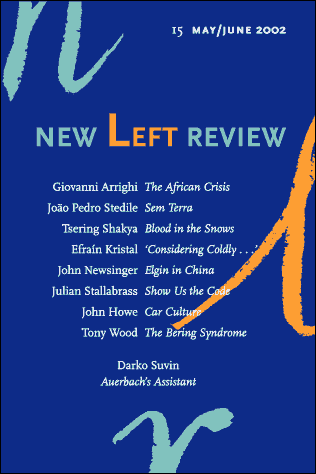What triggered the descent into misery of so many Sub-Saharan societies in the past twenty years? The regional roots of Africa’s disorders, and the structural transformations in the world system led by the USA that have overshadowed them.
In a landmark exchange, Tibet’s outstanding national historian replies to China’s dissenting writer Wang Lixiong (NLR 14), setting out his own view of Tibetan society and religion, and the PRC’s record in his country.
Does Spanish American literature illustrate or overturn the idea that in the ‘world republic of letters’ economic and cultural relations between centre and periphery run parallel? A Peruvian assesses Franco Moretti’s conjectures (NLR 1), and springs some surprises about Beckett.
A leader of Brazil’s Sem Terra explains the history and geography of the world’s largest movement of the rural poor. How to occupy land, mobilize support, resist the media and the state under a tropical brand of the Third Way.
Past, present and future of the automobile, as technological device and libidinal object; and some of the ways in which it has figured in narratives from Kipling onwards. Towards the de-cathected passenger-machine?
The sacking of the Emperor’s Summer Palace in Beijing by an Anglo-French expeditionary force was one of the high-points of nineteenth-century imperialism. The lucidity of its perpetrator, Elgin, offers a paradoxical contrast with the chorus of apologists for Anglo-American interventions today.
Julian Stallabrass on Sam Williams, Free as in Freedom: Richard Stallman’s Crusade for Free Software. The iconoclastic hacker who is challenging Microsoft’s dominion, using ‘copyleft’ agreements to lock software source codes into public ownership. Cultural and political implications of treating programs like recipes.
Tony Wood on Aleksandr Etkind, Tolkovanie puteshestvii. Rossiia i Amerika v travelogakh i intertekstakh. Russo-American literary–political relations, from Pushkin to Ayn Rand, in an ingeniously conciliatory mirror.
Darko Suvin on Peter Jehle, Werner Krauss und die Romanistik im NS-Staat. Germany’s most radical Romance scholar, who wrote on Corneille while awaiting execution in Nazi Berlin, and his contribution to a secular understanding of literature.
